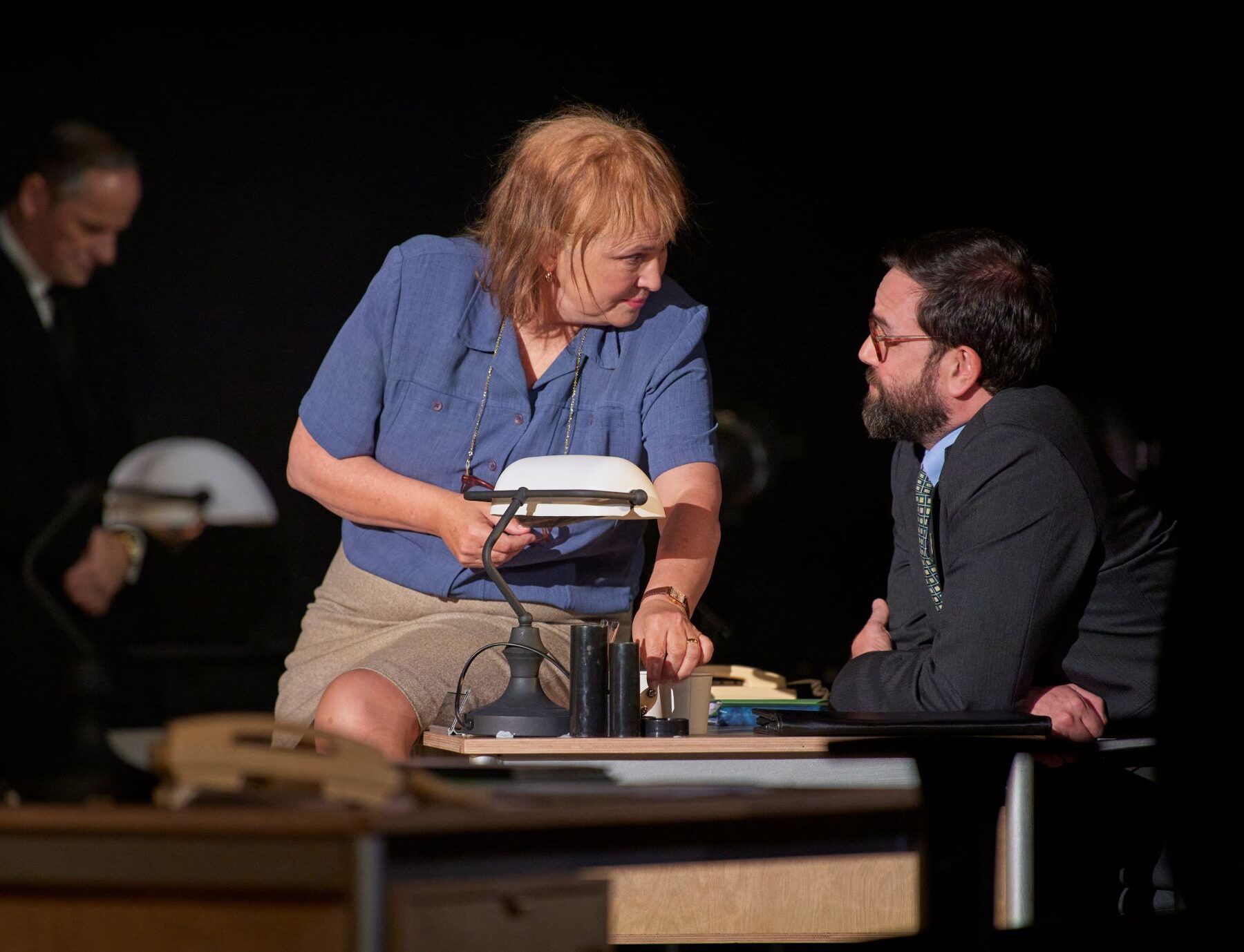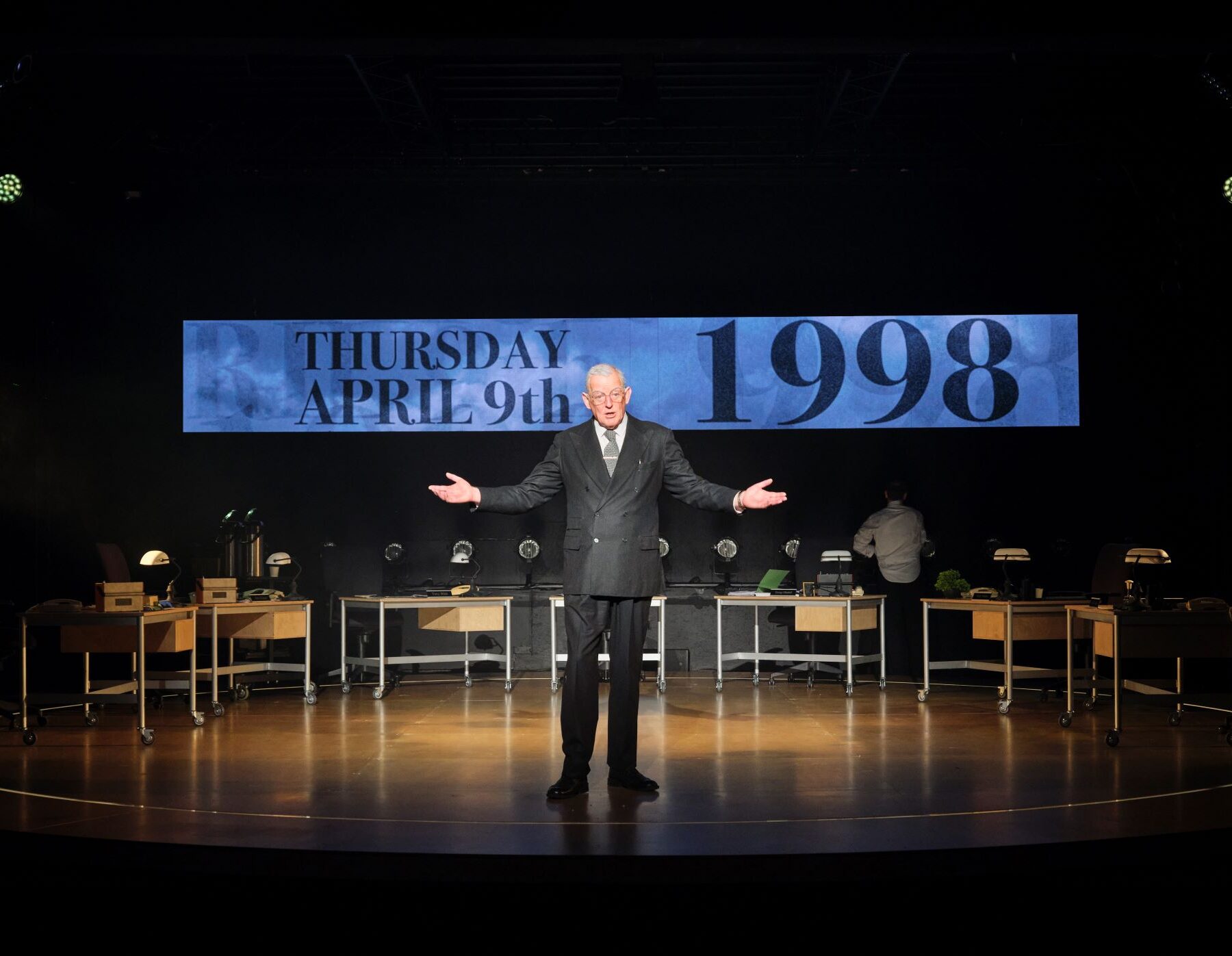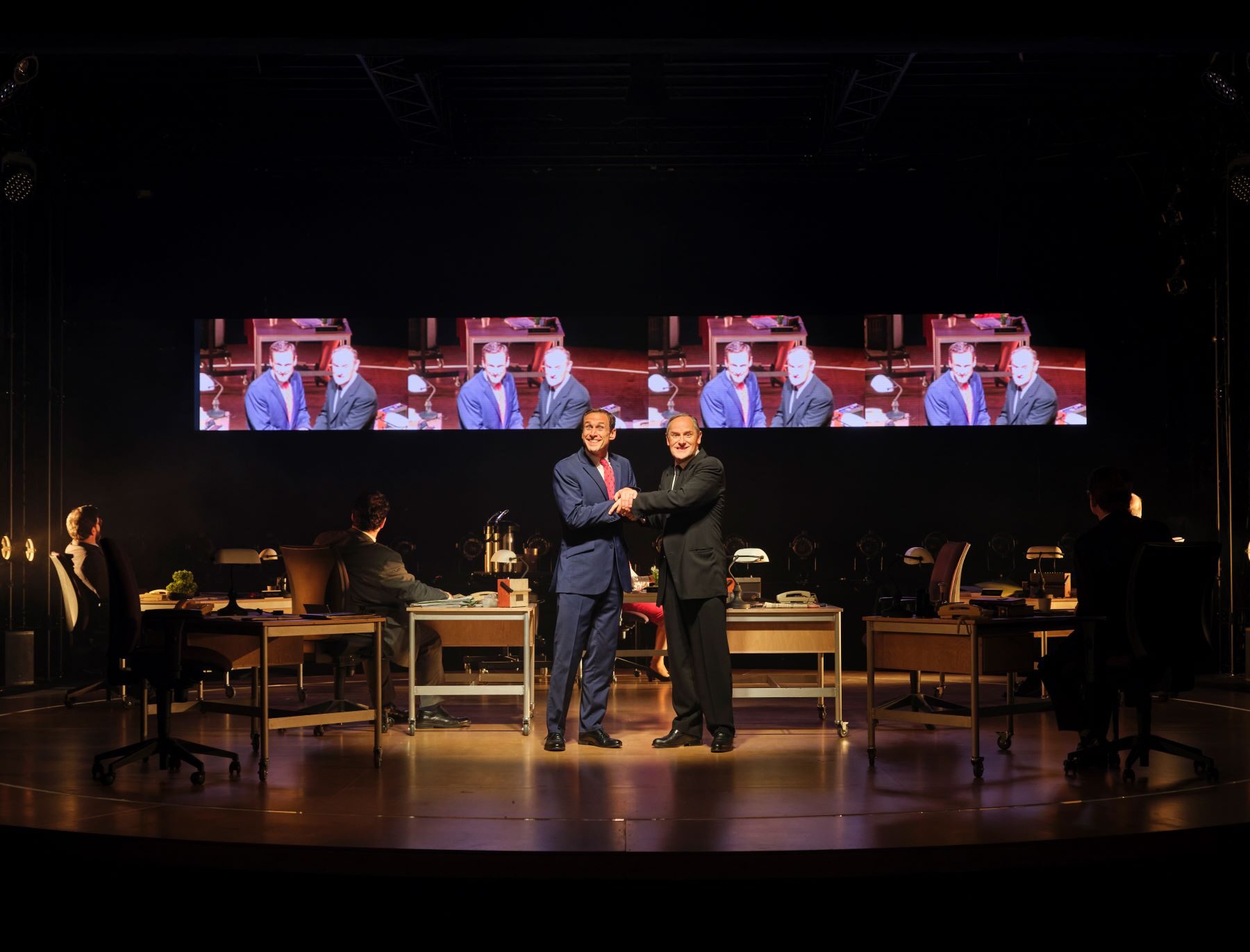Gate Theatre, 27 September–27 October 2024
A Lyric Theatre Production
By Sylvie Kleinman
‘This is not the time for soundbites: I feel the hand of history upon our shoulders.’ When a boyish and buoyant Tony Blair (Martin Hutson in an outstanding and entertaining performance) bounced around the stage uttering his iconic phrase (cleverly updated for dramatic purposes), the audience of Agreement giggled. And when he had triumphantly entered into the inner sanctum of the talks, to appropriately blaring trendy music, laughter had broken out. The idea of a dramatic recreation of the last days and hours of the final, fraught negotiations that led to the Good Friday Agreement in 1998 may be unhinging to anyone concerned with depicting genuine actors of history in the making, but here nothing romanticises, demonises nor heroises. Agreement was first staged to critical acclaim in Belfast’s Lyric Theatre in May 2023 and was shown in the Gate as part of Dublin’s 2024 Theatre Festival.

This play’s power is rooted in the interaction between the key political personalities so familiar to us: Adams, Hume and Trimble, Blair, Mowlam and Ahern, and Mitchell. The cast interpreting them deliver dynamic performances inseparable from the sharp and fast-paced script, tight direction and understated but extraordinarily effective set design, light and sound. As bluntness was their order of the day, we’ll be frank: accents are often off the mark, but everything else is admirably tight-knit. In RTÉ’s 25th-anniversary documentary The Agreement (reviewed in HI 31.4, July/Aug. 2023), we got insider details of these talks and saw rare black-and-white footage of the inside of the grim rooms and corridors of Stormont’s Castle Complex, where the talks were held. Rather than recreate that bleak décor the stage is bare, and only wheeled desks, chairs, papers and people matter. Bilateral meetings are held in lit corners, then the whole cast roll desks around to convey pairs shifting between rooms. Creativity conveys an otherworldliness that the actual participants may well have felt.
Their commitment is challenged by confinement, wonderfully enhanced by the backdrop: a massive, bunker-like rectangular opening serves as a window on the world. Mostly it frames the sky in baroque style but also serves as a slightly Orwellian message board, usefully signposting facts via an oversized date or time ticking on a huge clock, counting down the crucial minutes. Also displayed are contemporary headlines and, eerily, a set of screens replicating what we see, like in a control room. Yet we know that nothing was being broadcast from the inside, or even recorded. Over time, interviews and reminiscences allowed anecdotes to slip out, some of which are embedded into McCafferty’s slick dialogue. We feel the tension and the weight of responsibility challenging the protagonists in varying ways. But we know how the ‘story’ ends: the talks nearly collapsed yet they struck a deal and came out worthy of admiration.

‘Nothing is agreed until everything is agreed’: with these famously resonant words, the noble chairman George Mitchell (admirably delivered by Seán Kearns) opened this remarkable play. He is an explainer to the audience, strengthening our sense of being privileged witnesses behind the scenes. Tensions rise and there are clashes and forceful exchanges over the three strands to be agreed on; tempers flare and explode but then settle. Ruairi Conaghan ably delivers a stiff, stubborn and no-nonsense Trimble, whose sticky situation within his party was only recently acknowledged by Adams (Aaron McCusker). We should also not forget that these two pivotal influencers had hardly spoken until then. Paisley had by this stage withdrawn from the talks but makes his presence outside the building felt vocally. Hume (Dan Gordon) is energetic and perhaps more lively than in real life, but certainly a shrewd and convincing negotiator. Ahern’s frank reminiscences in the RTÉ documentary about contentious sticking-points, such as prisoner releases, help contextualise heated exchanges when these issues arise on stage, and Ronan Leahy’s demeanour squares well with the Bertie we know (if his Dublinese doesn’t).

Arguably, this theatrical recreation of private parleys, now held up internationally as the pathway to a landmark in conflict resolution, is motivated by the dilemma facing the negotiators and the humanity they demonstrated. We empathise with the unconventional and forceful Mo Mowlam, the only female in what was then certainly (at the top) a very male-dominated process. At the time she was undergoing chemotherapy for a brain tumour, and Andrea Irvine is compelling in projecting her multilayered character. Provocatively, she removes her wig to bare a pitiful scalp, goes about in stockinged feet and has a calming effect, but also talks straight and boldly.
Human nature and polarised sectarian views are trapped in a room, with a tight deadline ably managed by the firm Mitchell, while the outside world awaits: the genuinely dramatic context became something of a creative process in itself, and Agreement does apply some artistic licence. Some absurdity lightens the mood. Bill Clinton’s voice emerges from the rafters as he phones Belfast, reassuring everyone of his support and trusting that they can clinch it. Did he really joke to Mitchell, ‘George, you seem to have that sh..t under control’? On this point, the f-word flies around the room throughout like a bat out of a cave, possibly more than in reality, but as a nod to contemporary audiences that these people behaved themselves in front of a mike but behind closed doors effed and blinded just like anybody else—though probably not Trimble. What did Adams really say to him at the urinal, and did Hume ever do a wee jig? They certainly didn’t float around the room as they do on stage and, after clinching the deal to get ready for a press conference, elegantly and dramatically strew their papers all over the stage.
This neither mocks nor distorts what really happened. In making these individuals so personable, we should remember that they rose to fame in an age of increasing media presence and the humanising of politicians, or possibly a form of celebrity culture. We immediately recognise the game-changers in Agreement, which is moving, very watchable and even-handed. But it is also a form of public history. While the script does not claim to be an official record, some fact-checking is possible. Its enthusiastic reception as a cultural creation should not rule out some scrutiny from a conventional historical perspective.
Sylvie Kleinman is Visiting Research Fellow at the Department of History, Trinity College, Dublin.
